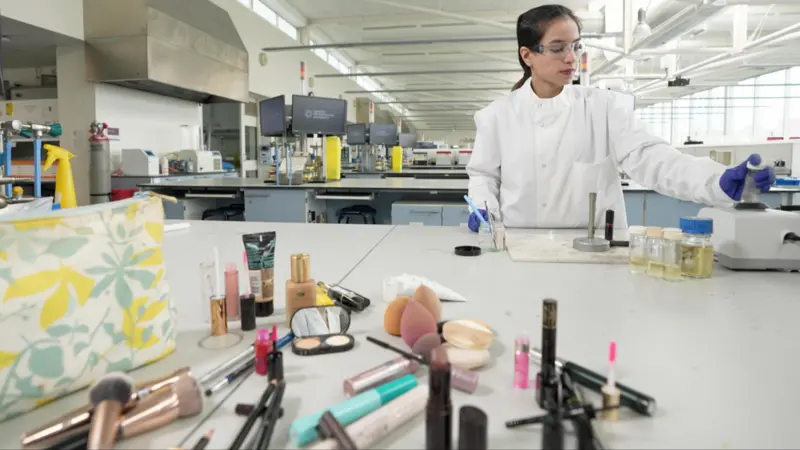
When was the last time you checked the expiration date on your makeup products? Most people rarely think about it. But could expired makeup be putting your skin, or even your health, at risk?
Have you ever considered how often you wash your makeup brushes? Or whether you’ve shared a friend’s mascara or tried out lipstick in a store? It might surprise you to learn which mascara, eyeliner, sponge, or brush in your bag might be home to the most bacteria.
Not being particularly diligent about cleaning my makeup tools or keeping track of expiration dates, I decided to put them to the test under the microscope of a professional at London Metropolitan University.
Dr. Maria Pilar Botti-Salo, a Senior Lecturer in Biology at the School of Human Sciences, led a lab analysis of more than 70 expired makeup products. These included eyeliners, mascaras, lip glosses, lipsticks, foundations, as well as makeup brushes and sponges, including some of my own. Each sample was carefully placed on agar plates and left in a controlled environment to allow any bacteria present to grow.

The results were shocking. Bacterial colonies from my samples were larger than expected. The most contaminated item was my eye pencil, which harbored far more bacteria than any other product tested. Dr. Botti-Salo explained that because the pencil frequently touches the eyelids, it picks up bacteria such as staphylococcus from the skin. I had to admit that I often left the lid off and stored my makeup bag in the bathroom, where humidity levels are high—conditions that promote bacterial growth.
Other samples, including brushes, sponges, and mascara, also showed signs of staphylococcus contamination. This particular bacterium can lead to a wide range of infections, from mild skin irritations to more serious conditions such as conjunctivitis, erysipelas, and impetigo.
I was puzzled. I had used that same eyeliner multiple times without suffering any of these infections. Dr. Botti-Salo explained that a healthy, intact skin barrier usually offers strong protection. But if the skin is compromised due to a bruise, cut, or an underlying health condition, it becomes more vulnerable to bacterial invasion. People with weakened immune systems are especially at risk.
Hand hygiene plays a critical role. Hands can easily spread a host of bacteria, and applying products like foundation, lip balm, or eye shadow with unwashed hands can transfer these bacteria directly onto your skin and into the product itself. Dr. Botti-Salo shared some even more concerning news: the presence of E. coli was found in some of the samples. E. coli typically resides in the intestines and suggests fecal contamination—usually a result of poor hand hygiene or keeping makeup in unsanitary environments.

Even flushing a toilet can propel bacteria-laden droplets into the air, potentially reaching your makeup if it’s stored nearby. These droplets can carry Enterobacteriaceae, a bacterial family that includes species capable of causing respiratory infections, urinary tract infections, bone infections, and even heart infections.
Moreover, the research revealed the presence of Candida, a type of fungus found in cosmetics. This fungus, if it enters the body through a wound or mucous membrane, can cause conditions like oral thrush or vaginal candidiasis. Further studies by Aston University in Birmingham tested nearly 500 cosmetic items and found that 79–90% were contaminated with some form of bacteria, fungi, or parasites. These ranged from low-risk organisms to potentially deadly ones like E. coli.

Lead researcher Dr. Amreen Bashir clarified that while many used products and tools are contaminated, they only pose a serious health risk if they find a pathway into the body. These risks can be minimized by regularly washing tools, disinfecting them, and disposing of expired products.
Expiration dates on makeup aren’t arbitrary. They serve to indicate how long the preservatives in a product will effectively prevent bacterial growth. Products with high water content—like liquid foundation or mascara—are especially vulnerable once opened. Their expiration can range from three to twelve months, depending on the type and ingredients.

Dr. Bashir emphasized that if a product doesn’t have a clear expiration date, it’s best to discard it after three months or sooner if contamination is suspected. For instance, if a product is dropped, used by someone else, or comes into contact with unwashed hands, it’s better to be safe and replace it rather than risk an infection. If in doubt, replace it.
The dirtiest items in your makeup kit are usually mascara and liquid foundation, both of which tend to harbor the most bacteria. Tools like brushes and sponges used to apply these products are just as risky. Because these tools absorb moisture, they become ideal breeding grounds for microbes.
Cleaning brushes and sponges with hot water and soap, allowing them to dry completely in a well-ventilated area, is crucial. There’s no need for fancy cleaning solutions. Just ensure they are thoroughly dry before putting them back into a bag or case.
Makeup should never be stored in the bathroom, where humidity creates an ideal environment for bacteria. Products should always be tightly sealed to prevent airborne germs and dust from settling inside.
Monitoring expiration dates is critical. Keeping small stickers or writing dates directly on packaging can serve as reminders. Sharing makeup with others increases the risk of contamination and should be avoided, particularly by individuals with weakened immune systems.
Ultimately, staying informed and practicing simple hygiene habits—like washing hands before applying makeup and properly storing tools—can go a long way in protecting your health from the invisible threats lurking in your beauty bag.




